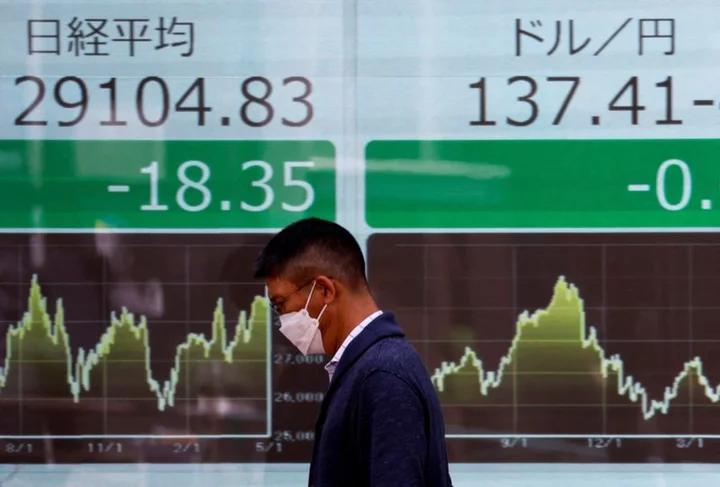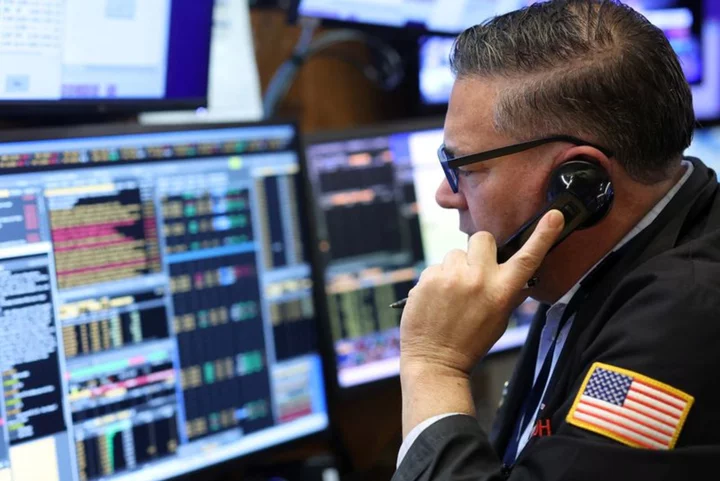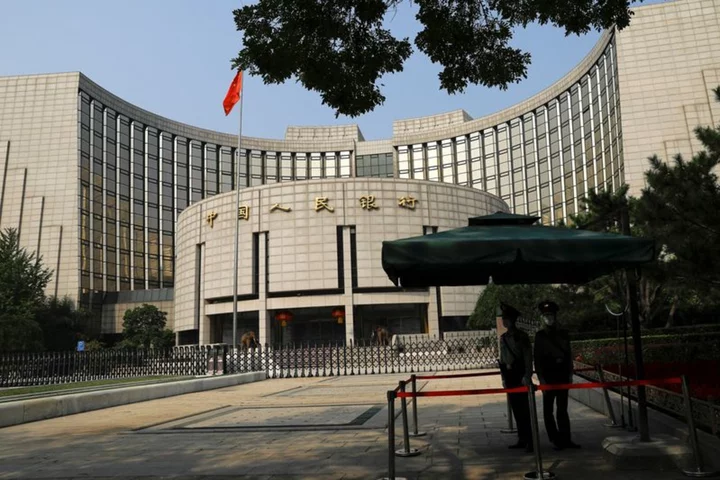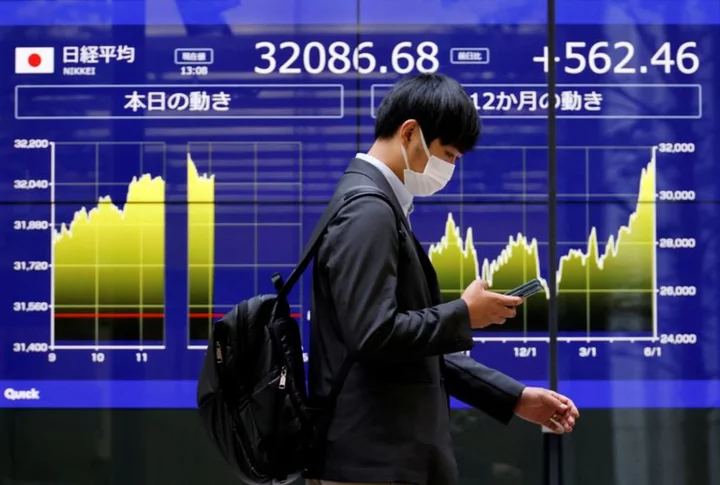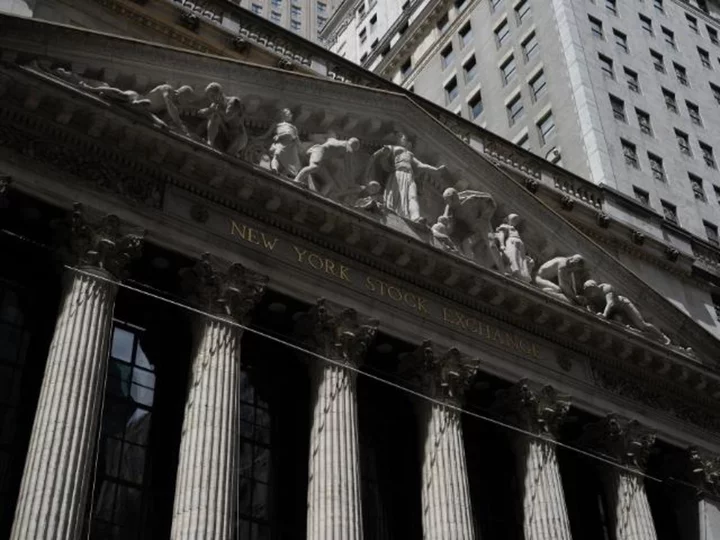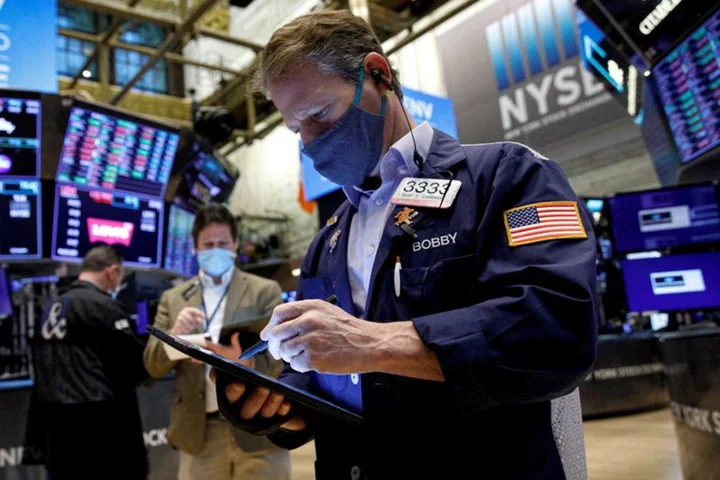By Stella Qiu
SYDNEY Asian stocks started the week on a cautious note as investors braced for the release of China's industrial and retail data, while awaiting a host of U.S. Federal Reserve officials to speak to vindicate market pricing of rate cuts this year.
Both S&P 500 futures and Nasdaq futures eased 0.1% in early trade, following a report on Friday showed U.S. consumer sentiment slumped to a six-month low in May and long-term inflation expectations jumped to the highest since 2011, boosting the U.S. dollar and Treasury yields.
In emerging markets, the Turkish lira sank to a two-month low after weekend elections looked headed for a runoff, while the Thai baht rallied almost 1% after Thailand's opposition routed military-allied parties also in weekend polls.
On Monday, MSCI's broadest index of Asia-Pacific shares outside Japan wobbled between losses and gains and was last up 0.1%. Japan's Nikkei bucked the trend with a gain of 0.5%, building on the optimism from last week during the earnings season.
China's blue-chip index was flat in early trade, after skidding 2% last week, while Hong Kong's Hang Seng index rose 0.3%, having also taken a 2.1% battering.
The country's central bank on Monday rolled over maturing medium-term policy loans while keeping interest rates unchanged, despite disappointing data last week that fuelled concerns about a global slowdown.
China is due to report monthly industrial production, retail sales and fixed asset investment data on Tuesday.
"A big year-on-year improvement shouldn't surprise given it is measured against a stagnant economy that was in lockdown," said Chris Weston, head of research at Pepperstone.
"However, with China's data throwing up a few concerns of late - we've seen poor import, PPI, and loan data - China's growth is very much at the heart of market moves," said Weston.
Also this week, a host of Federal Reserve officials are speaking, with Chair Jerome Powell set for Friday, and could generate plenty of headlines to move the dial further.
Markets are still seeing this is the peak for Fed funds rates and pricing in 70 basis points in cuts by the end of this year, after the CPI and PPI data last week supported the case of Fed pausing given the slowing inflation.
Fed Governor Michelle Bowman said on Friday that the U.S. central bank probably will need to raise interest rates further if inflation stays high.
Joseph Capurso, head of International Economics at Commonwealth Bank of Australia, believes the persistence of U.S. inflation would take out the pricing for near term cuts to the Funds rate, and contribute to a recovery in the dollar in coming months.
The U.S. dollar was hovering around a five-week high against major peers on Monday, extending its best weekly rise since September from the week before. It was last at 102.64, after surging 1.4% last week on global growth concerns.
Very much on investors' mind was the uncertainty about lifting the U.S. debt ceiling and the return of bank worries. U.S. President Joe Biden expects to meet with Congressional leaders on Tuesday for talks to raise the nation's debt limit and avoid a catastrophic default.
Concerns about U.S. Congress not raising the debt ceiling on time have created large distortions in the short-end of the yield curve as investors avoid bills that come due when the Treasury is at risk of running out of funds, and pour into alternative issues.
The yield on benchmark 10-year notes was little changed at 3.4588%, after rising 6 basis points on Friday, and two-year yields eased 2 basis points to 3.9830%, having also jumped 10 basis points in the previous session.
Oil prices declined for the fourth straight session. U.S. crude futures eased 0.5% to $69.71 per barrel, while Brent crude futures were down 0.6% to $73.74 per barrel.
Gold prices were 0.2% higher at $2,014.95.49 per ounce.
(Reporting by Stella Qiu; Editing by Sonali Paul)

